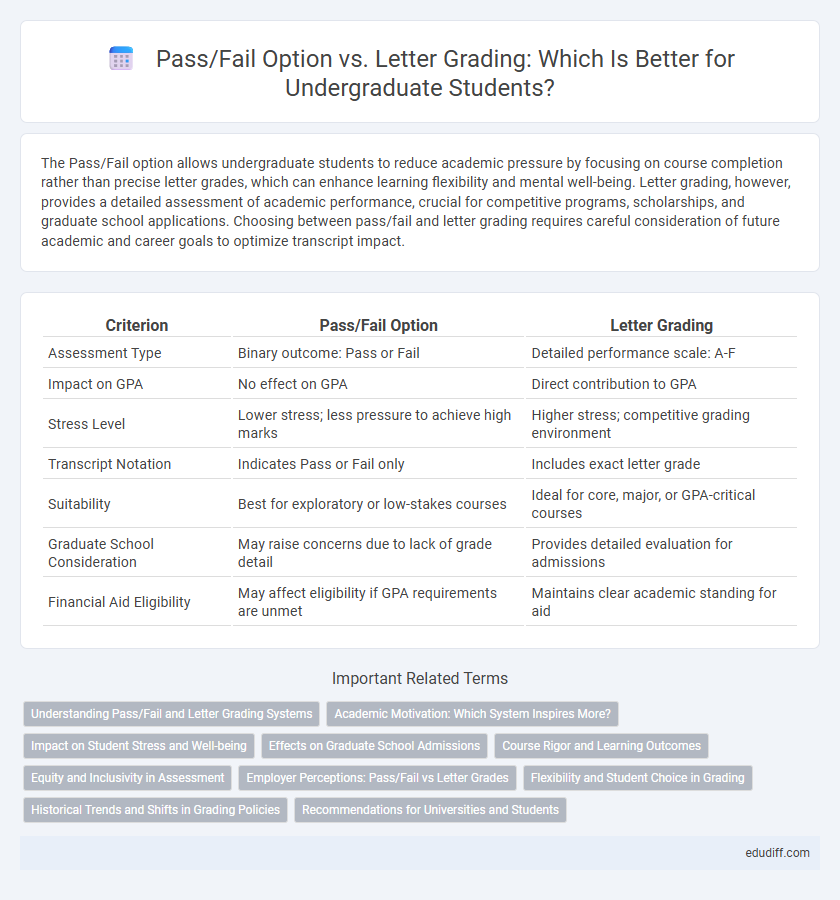The Pass/Fail option allows undergraduate students to reduce academic pressure by focusing on course completion rather than precise letter grades, which can enhance learning flexibility and mental well-being. Letter grading, however, provides a detailed assessment of academic performance, crucial for competitive programs, scholarships, and graduate school applications. Choosing between pass/fail and letter grading requires careful consideration of future academic and career goals to optimize transcript impact.
Table of Comparison
| Criterion | Pass/Fail Option | Letter Grading |
|---|---|---|
| Assessment Type | Binary outcome: Pass or Fail | Detailed performance scale: A-F |
| Impact on GPA | No effect on GPA | Direct contribution to GPA |
| Stress Level | Lower stress; less pressure to achieve high marks | Higher stress; competitive grading environment |
| Transcript Notation | Indicates Pass or Fail only | Includes exact letter grade |
| Suitability | Best for exploratory or low-stakes courses | Ideal for core, major, or GPA-critical courses |
| Graduate School Consideration | May raise concerns due to lack of grade detail | Provides detailed evaluation for admissions |
| Financial Aid Eligibility | May affect eligibility if GPA requirements are unmet | Maintains clear academic standing for aid |
Understanding Pass/Fail and Letter Grading Systems
Pass/fail grading systems categorize student performance simply as passing or failing, eliminating traditional letter grades and often reducing academic pressure by focusing on mastery rather than competition. Letter grading systems assign specific grades such as A, B, C, D, or F, offering detailed feedback on a student's level of achievement and helping differentiate performance in competitive academic environments. Understanding these systems is crucial for undergraduates when choosing between assessing knowledge retention and receiving precise evaluations for GPA calculations.
Academic Motivation: Which System Inspires More?
Research indicates that letter grading often enhances academic motivation by providing clear performance feedback and fostering a competitive environment that encourages student effort and achievement. In contrast, the pass/fail option may reduce stress and anxiety but can sometimes decrease students' drive to excel due to lack of detailed performance differentiation. Institutions observing higher engagement levels typically report that letter grades inspire more consistent academic commitment compared to pass/fail systems.
Impact on Student Stress and Well-being
The Pass/Fail option reduces academic pressure by eliminating grade competition, which significantly lowers student stress and promotes mental well-being. Letter grading often intensifies anxiety due to performance benchmarks and GPA impact, potentially leading to burnout and decreased motivation. Research shows students with Pass/Fail options report higher satisfaction and better overall emotional health during demanding coursework.
Effects on Graduate School Admissions
Graduate school admissions committees often evaluate applicants based on a combination of GPA and course rigor, making letter grades a more reliable indicator of academic performance than pass/fail options. Pass/fail grading may limit the ability to demonstrate mastery and differentiate oneself in competitive fields, potentially reducing scholarship and admission opportunities. Some programs may view excessive pass/fail courses as a lack of academic challenge, which can negatively impact an applicant's competitiveness.
Course Rigor and Learning Outcomes
Pass/Fail options can reduce stress and encourage risk-taking in challenging courses but may limit detailed assessment of student mastery and differentiation of learning outcomes. Letter grading provides clearer indicators of student performance and understanding, promoting consistent effort and motivation in rigorous coursework. Balancing these assessment methods impacts how students engage with material and demonstrate competence.
Equity and Inclusivity in Assessment
Pass/fail options promote equity by reducing stress and accommodating diverse learning styles, benefiting students from varied backgrounds and abilities. Letter grading often amplifies disparities by emphasizing competition and fixed benchmarks, which can disadvantage marginalized groups. Implementing pass/fail assessments fosters inclusivity, allowing students to demonstrate competence without the pressure of traditional grading biases.
Employer Perceptions: Pass/Fail vs Letter Grades
Employers often perceive letter grades as a clearer indicator of academic achievement and skill proficiency compared to pass/fail options, which may lack granularity in evaluating student performance. Studies indicate that hiring managers tend to favor candidates with detailed grade information when assessing applicant qualifications for competitive roles. However, some industries prioritize practical experience over grading schemas, reducing the impact of pass/fail options on employment decisions.
Flexibility and Student Choice in Grading
The Pass/Fail option offers significant flexibility by allowing students to explore diverse subjects without the pressure of impacting their GPA, thus encouraging intellectual risk-taking and broad learning. Letter grading provides precise evaluation and differentiation of performance, which can be crucial for graduate school applications and competitive internships. Providing both options empowers students to tailor their academic journey according to individual goals, balancing exploration with the need for a detailed academic record.
Historical Trends and Shifts in Grading Policies
Pass/Fail options gained prominence during global crises like the COVID-19 pandemic, reflecting a shift towards flexible assessment methods in undergraduate education. Letter grading systems, historically dominant, are being reconsidered as institutions prioritize student well-being and equitable evaluation. Recent trends indicate a growing emphasis on hybrid grading policies balancing traditional academic standards with the need for adaptability.
Recommendations for Universities and Students
Universities should implement flexible pass/fail options to accommodate diverse learning styles and reduce academic stress, while maintaining rigorous standards for essential courses through letter grading. Students are advised to strategically choose pass/fail grading for elective or less critical subjects to preserve GPA, reserving letter grades for major-related or competitive courses that impact future academic or career opportunities. Clear communication about grading policy implications and academic goals enhances informed decision-making and supports academic success.
Pass/Fail Option vs Letter Grading Infographic

 edudiff.com
edudiff.com